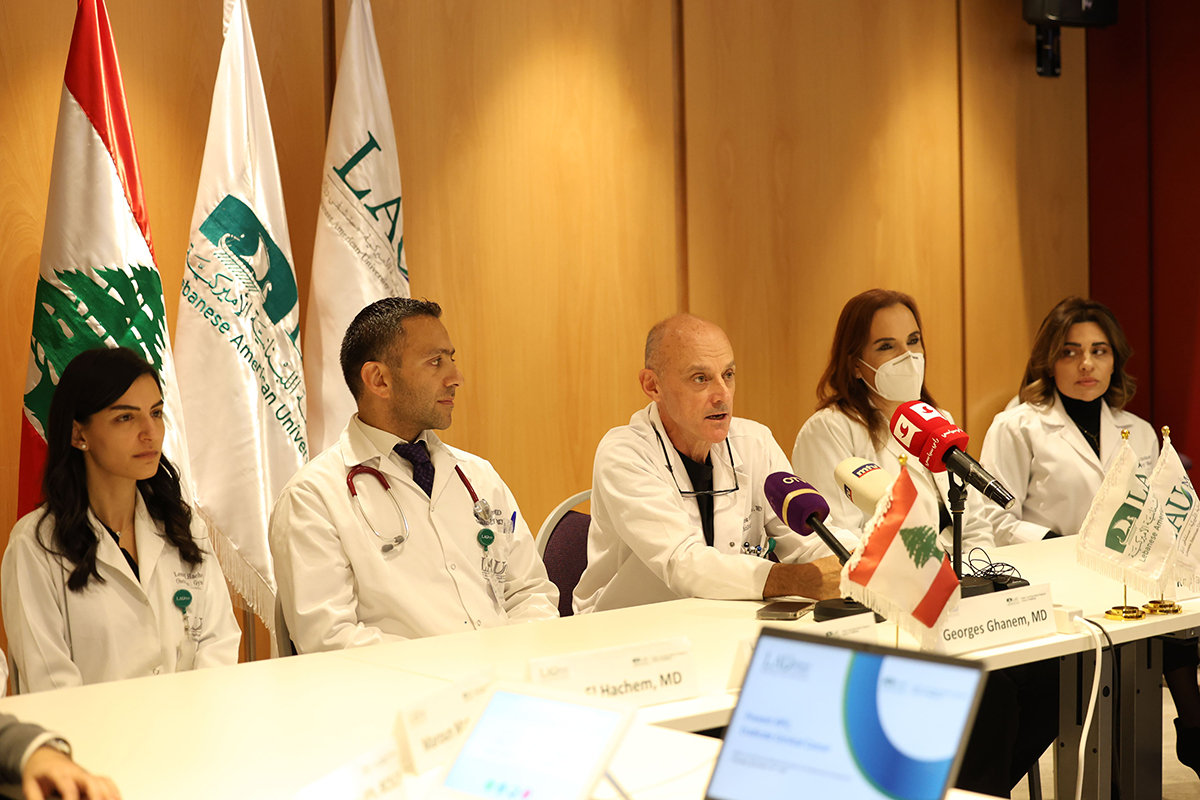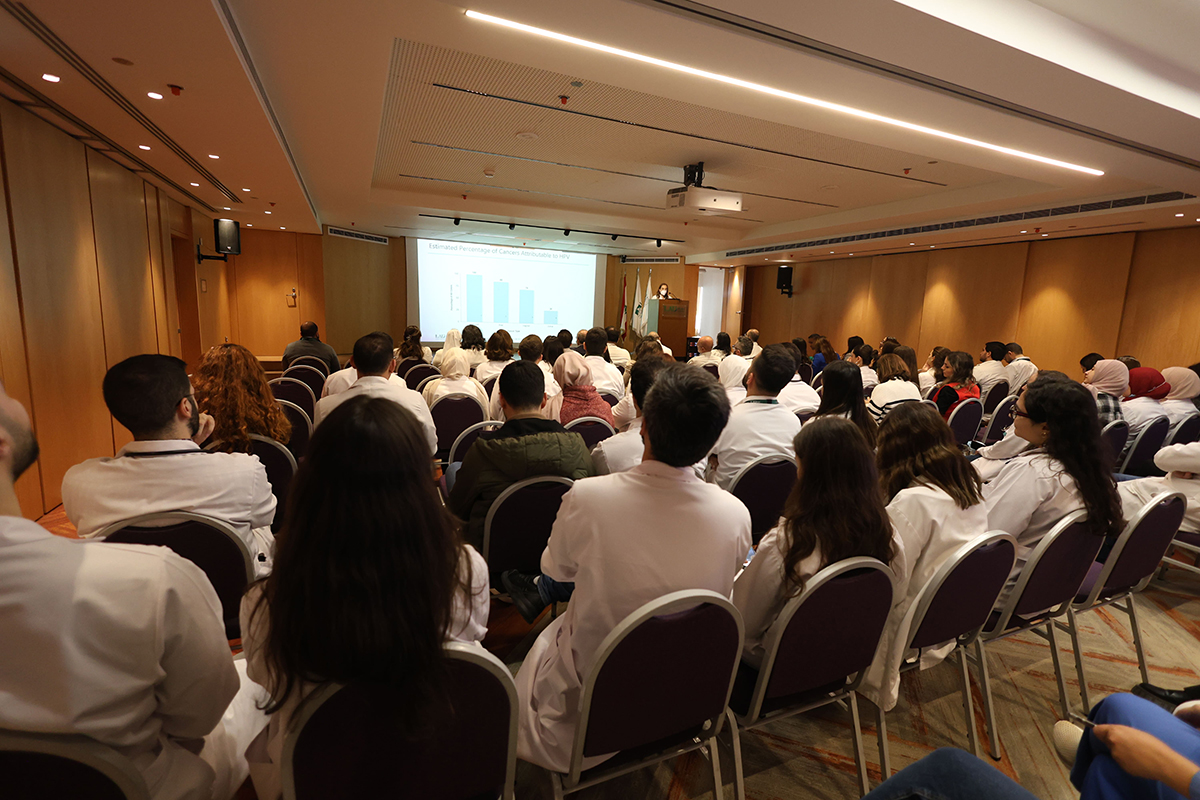How Vaccinating Nine- to 45-Year-Olds Can Help Eradicate Cervical Cancer
Vaccination against human papillomavirus (HPV) could prevent more than 90 percent of cancers as revealed at the latest awareness campaign held at the LAU Medical Center-Rizk Hospital.
Over the years, immunization against life-threatening infections has enhanced the quality of life for humanity, substantially reducing mortality rates. And now, thanks to modern medicine, significant strides are made in the fight against cancers, once deemed inevitable.
It is reported that cervical cancer is the fourth most common cancer in women globally and the sixth most common cancer in Lebanese women aged 15 to 44. Persistent HPV infection of the cervix (the lower part of the uterus) if left untreated causes 95 percent of cervical cancers, which in Lebanon claim 42 lives annually. However, with a 93 percent prevention rate, cervical cancer can be eradicated with the help of mass vaccination and early screening.
Joining the World Health Organization’s (WHO) global strategy to accelerate the elimination of cervical cancer and HPV-related cancers, the LAU Medical Center-Rizk Hospital and LAU Medical Center-St John’s Hospital launched an extensive awareness and vaccination campaign against HPV on November 30.
The campaign was preceded by a press conference, followed by a Continuing Medical Education (CME) lecture titled Prevent HPV, Eradicate Cervical Cancer that included informative talks, case presentations, and a panel discussion about HPV-related diseases and misconceptions led by faculty members of the LAU Gilbert and Rose-Marie Chagoury School of Medicine.
This multidisciplinary initiative “signifies the start of a national campaign that we intend to extend to the Lebanese community,” said Dr. Hady Ghanem, clinical associate professor of medicine and head of the hematology-oncology division of the Department of Internal Medicine at LAU’s Gilbert and Rose-Marie Chagoury School of Medicine. “The objective is to inform individuals about HPV-related diseases and emphasize the significance of vaccination in proactively preventing certain cancers,” he added.
HPV vaccination could prevent more than 90 percent of cancers caused by the virus from ever developing. Administering the vaccine to pre-teen children is effective in protecting them against HPV into adulthood. Dr. Maroun Matar, clinical assistant professor of medicine and acting chair of the Department of Pediatrics, recommends gender-neutral vaccination starting at the age of nine.
“Those below 15 years of age receive two doses while those above 15 receive three, within a six-to-12-month interval,” added Dr. Roula Husni Samaha, clinical professor of medicine and interim chair of the Department of Internal Medicine at the school of medicine.
According to Dr. Rania Sakr, clinical assistant professor of medicine and head of the family medicine division at the Department of Internal Medicine, the vaccine is most effective when given before the age of 26, but individuals aged 26 to 45 can still benefit from it. This protection extends to strains associated with cervical, oropharyngeal, penile, and anal cancers.
This preventive measure not only saves lives and alleviates the hardships and financial burdens on affected individuals but it also lightens the load on healthcare systems, as the incidence of such diseases can be significantly reduced.
The highly contagious human papillomavirus is the most prevalent sexually transmitted infection (STI), affecting over 90 percent of sexually active men and 80 percent of sexually active women during their lifetime. Around 50 percent of these HPV infections involve certain high-risk types of HPV, which can cause cancer. Notably, a persistent HPV infection is a major contributor to various cancers, with cervical cancer being the most prominent among them. Yet, by adopting preventive measures like early vaccination and suitable screening, the likelihood of developing these cancers can be dramatically reduced, and, in some instances, prevented.
“LAU’s medical centers realize the importance of treating this threat to the general public health,” said Dr. Georges Ghanem, clinical professor and deputy CEO for strategy and development at the LAU Medical Center-Rizk Hospital, “and hereby endorse WHO’s global strategy for eliminating cervical cancer by 2030.”
“No woman should die from cervical cancer,” said Dr. Tony Zreik, LAU’s vice president for health affairs. “We have the technical, medical and preventive tools and approaches to eliminate it.”
The panel discussion answered several cultural challenges and misconceptions brought forward by the attendees and highlighted the safety and effectiveness of the vaccination even after contracting the virus. According to the Clinical Associate Professor of Medicine and Head of the Division of Minimally Invasive and Robotic Surgery Department of Obstetrics and Gynecology, Dr. Lena El Hachem, administering the vaccination to someone who already has HPV can help protect the patient against other strains.

